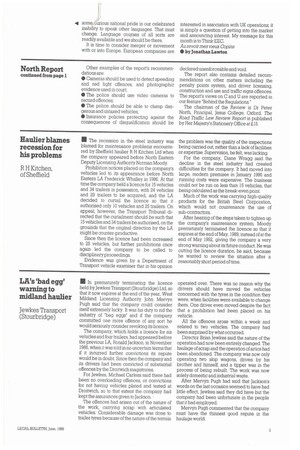Haulier blames recession for his problems
Page 69

If you've noticed an error in this article please click here to report it so we can fix it.
R H Kitchen, of Sheffield
• The recession in the steel industry was blamed for maintenance problems encountered by Sheffield haulier R H Kitchen Ltd when the company appeared before North Eastern Deputy Licensing Authority Norman Moody.
Prohibition notices placed on the company's vehicles led to its appearance before North PAstern LA Frederick Whalley in 1986. At that time the company held a licence for 15 vehicles and 34 trailers in possession, with 24 vehicles and 29 trailers to be acquired, and the LA decided to curtail the licence so that it authorised only 10 vehicles and 25 trailers. On appeal, however, the Transport Tribunal directed that the curtailment should be such that 15 vehicles and 34 trailers be authorised, on the grouincls that the original direction by the LA might be counter-productive.
Since then the licence had been increased to 25 vehicles, but further prohibitions once again led the company to be called to disciplinary proceedings.
Evidence was given by a Department of Transport vehicle examiner that in his opinion the problem was the quality of the inspections being carried out, rather than a lack of facilities or expertise. Supervision, he felt, was lacking.
For the company, Diane Wragg said the decline in the steel industry had created difficulties for the company. It had moved into large, modem premises in January 1986 and running costs were expensive. The business could not be run on less than 15 vehicles, that being calculated as the break-even point Much of the work was carrying high-quality products for the British Steel Corporation, which would not countenance the use of sub-contractors.
After hearing of the steps taken to tighten up the company's maintenance system, Moody prematurely terminated the licence so that it expires at the end of May, 1989, instead of at the end of May 1992, giving the company a very strong warning about its future conduct. He was cutting the licence duration, he said, because he wanted to review the situation after a reasonably short period of time.
















































































































